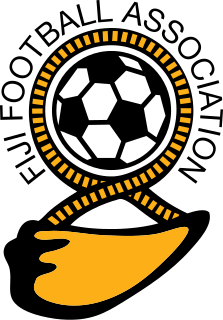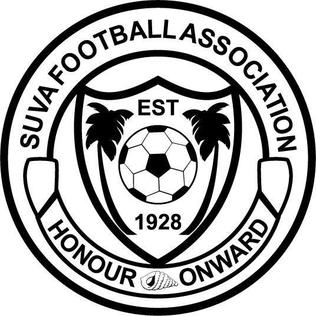Related Research Articles

Fiji, officially the Republic of Fiji, is an island country in Melanesia, part of Oceania in the South Pacific Ocean. It lies about 1,100 nautical miles northeast of New Zealand. Fiji consists of an archipelago of more than 330 islands—of which about 110 are permanently inhabited—and more than 500 islets, amounting to a total land area of about 18,300 square kilometres (7,100 sq mi). The most outlying island group is Ono-i-Lau. About 87% of the total population of 883,483 live on the two major islands, Viti Levu and Vanua Levu. About three-quarters of Fijians live on Viti Levu's coasts: either in the capital city of Suva; or in smaller urban centres such as Nadi—where tourism is the major local industry; or in Lautoka, where the sugar-cane industry is dominant. The interior of Viti Levu is sparsely inhabited because of its terrain.

Suva is the capital of Fiji, and its largest metropolitan city. It is located on the southeast coast of the island of Viti Levu, in Rewa Province, Central Division.

The Fiji Football Association is the governing body of football in Fiji. It came into existence in 1961.
The Indian Imperial Association of Fiji (I.I.A.) was active in Fiji during the last years of the indenture system, safeguarding the interests of and assisting in the improvement of the Indian community.
Sadhu Vashist Muni was a Hindu missionary from India, who came into prominence in Fiji when he assumed the leadership of the strike in the western districts of Fiji in 1921. Mystery surrounded him during his short stay in Fiji and tales of his miraculous deeds still circulate in Fiji. The Government could not find out much about him from its sources of intelligence but deported him in the belief that he was an agent of Gandhi. After his arrest, the Government House in Suva was struck by lightning and destroyed which only heightened the belief in the power this mysterious sadhu.

Manilal Maganlal Doctor was a British Indian barrister and politician, who travelled to numerous countries of the British Empire, including Fiji, Mauritius and Aden, providing legal assistance to the local ethnic Indian population. He met Gandhi, who asked him to go to Mauritius, where he represented Indo-Mauritians in court and edited a newspaper, The Hindustani. Gandhi later informed him of the need for a barrister in Fiji and he arrived in Fiji in 1912. In Fiji he also represented Indo-Fijians in court, started a newspaper, Indian Settler and established an organisation for Fiji Indians, known as the Indian Imperial Association. In 1916 when he was by-passed for nomination to the Legislative Council of Fiji, his relationship with the Government of Fiji deteriorated. The Government accused him of the violence and sabotage of the 1920 strike and deported him. He was barred from practicing law in several British colonies. He later managed to practice law in Aden, Somalia and Bihar State in India but spent his final days in Bombay.

Islam In Fiji, has a high following in Fiji. Muslims are mostly Sunni followers Imam Abu Hanifa, with a small minority adhering to Shia or Ahmadiyya. In the 1966 elections a Suva-based Muslim communal party, the Muslim Political Front, took part.
The South Indians in Fiji are mainly descendants of the 15,132 contract labourers who were brought to Fiji between 1903 and 1916. This represents about 25% out of a total of 60,965 contract labourers who were brought to Fiji between 1879 and 1916. They were forced in to ships from Madras and were mainly recruited in the districts of North Arcot, Madras, Krishna, Godavari, Visakhapatnam, Tanjore, Malabar and Coimbatore. More than half of the labourers from South India were recruited from North Arcot and Madras, but most of those recruited in Madras were originally from North Arcot and Chingleput.
Tulsi Ram Sharma was the first Indo-Fijian to qualify as a lawyer. He served one term as member of the Legislative Council and three terms as the President of Fiji Indian Football Association. He was one of the founding members of the Maha Sangh, but his association with farmers' union was short-lived. In 1941 he was appointed to Central Indian War Committee, formed by the Government to enlist the support of Indians to the war effort.

Pandit Ami Chandra Vidyalankar was an Indo-Fijian educator, preacher, labour leader, politician and football administrator. He served as a member of the Legislative Council between 1947 and 1953.

Rewa Football Club is a Fijian semi-professional football club based in Nausori, playing in the National Football League. Rewa's home ground is Vodafone Ratu Cakobau Park
Andrew Indar Narayan Deoki was an Indo-Fijian statesman who served his community as a social and religious leader, soccer administrator, member of the Legislative Council and Senate in independent Fiji and as Attorney General.

Suva Football Club is a Fijian football club that competes in the Fiji Premier League, the top flight of Fijian football. The club is based in Suva. Their home stadium is ANZ National Stadium. Their uniform is white shirt, black shorts and white socks.
Levuka F.C. was a Fijian football team playing in the second division of the Fiji Football Association competitions. It is based in Levuka, which is the only town on Ovalau Island, in the Fiji group. Their home stadium is Nasau Park.
Ben Mohammed Jannif was an Indo-Fijian businessman, scout leader, soccer administrator and politician. He was one of the architects of Fiji Indian Football Association and served as a member of the Legislative Council from 1950 to 1953.

Australian rules football in Oceania is the sport of Australian rules football as it is watched and played in the Oceanian continent.
Unlike the majority of Fiji's Indian population, who are descendants of Indian indentured labourers brought to Fiji between 1879 and 1916, most of the Sikhs came to Fiji as free immigrants. Most Sikhs established themselves as farmers. Sikhs also came to Fiji as policemen, teachers and preachers. In recent years large numbers of Sikhs have emigrated from Fiji, especially to the United States, Canada, the United Kingdom, Australia and New Zealand. Sikhs in Fiji are generally referred to as Punjabis.
Hindu Maha Sabha was an organisation representing various Hindu organisations and was formed in Fiji in 1926, following the formation of All-India Hindu Maha Sabha in India. The formation of the organisation both in India and Fiji occurred after the assassination of Swami Shraddhanand, a Hindu activist in India. The formation of the Sabha in Fiji coincided with the formation of a national Muslim organisation, the Fiji Muslim League.
This is a synopsis of organisations formed by Indians in Fiji. When they became free from the bondage of indenture and were able to organise themselves, they founded numerous organizations to seek social and political justice. These organisations promoted the teaching of Indian languages and religious practices and also to helped others in time of need. Some of the successful organisations are listed below in order in which they were established. Some, such as the National Federation Party, are no longer exclusively Indian, but are still predominantly so.
Indian Association of Fiji has been the name used by organisations formed at different times in the history of Fiji, to unite different groups within the Fiji Indian community to work to improve the plight of Indians in Fiji.
References
- Gillion, Kenneth (1977). The Fiji Indians: Challenge to European Dominance 1920-1946. Australian National University Press. ISBN 0-7081-1291-9.